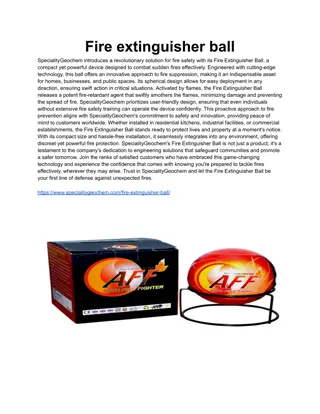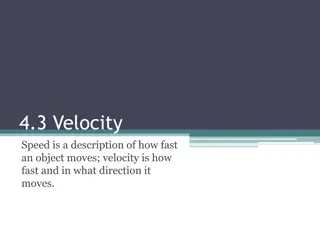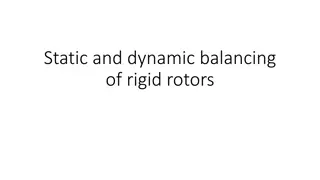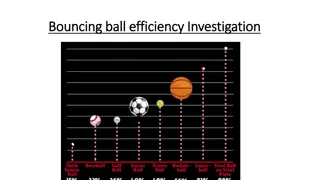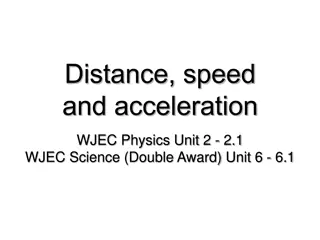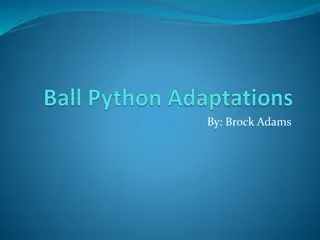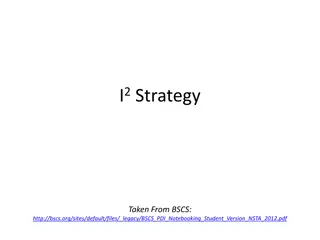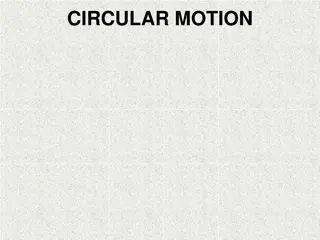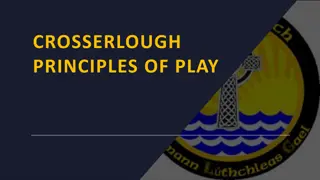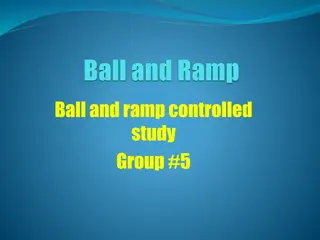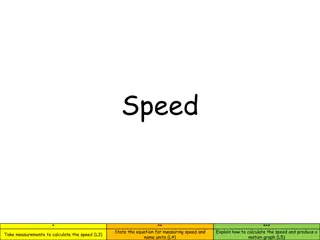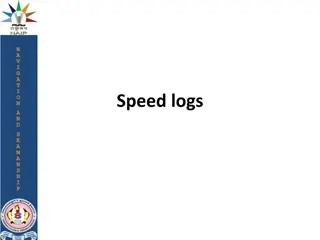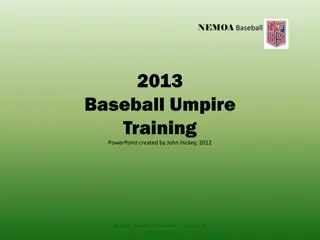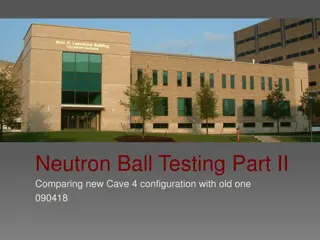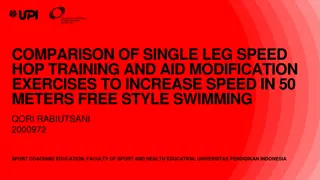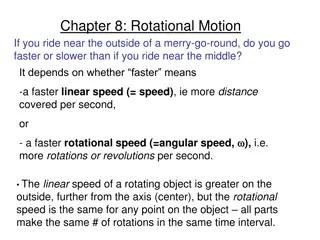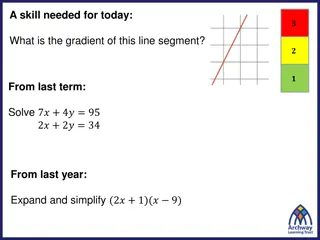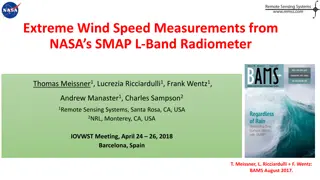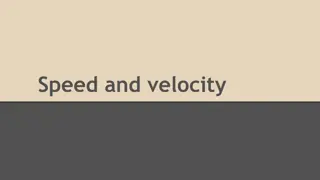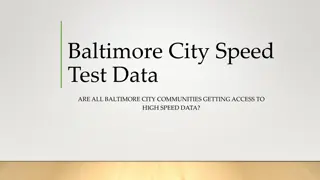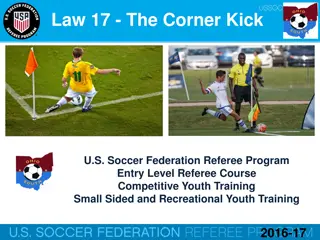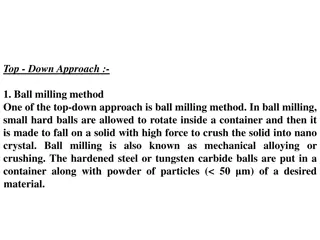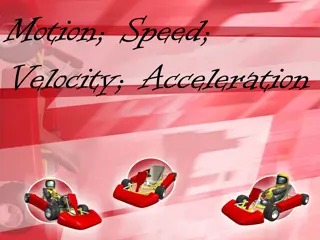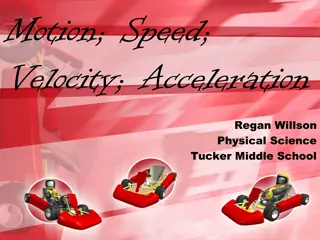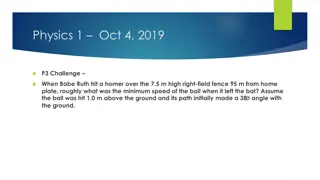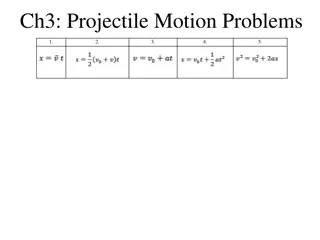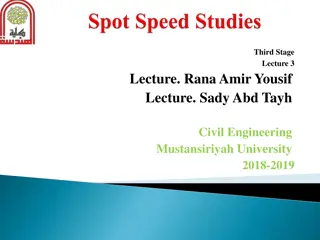Fire extinguisher ball
SpecialityGeochem introduces a revolutionary solution for fire safety with its Fire Extinguisher Ball, a compact yet powerful device designed to combat sudden fires effectively. Engineered with cutting-edge technology, this ball offers an innovative approach to fire suppression, making it an indispe
6 views • 2 slides
Understanding Velocity vs. Speed in Physics
Velocity and speed are fundamental concepts in physics that describe how fast an object is moving and in what direction. While speed is a scalar quantity representing the rate of motion, velocity is a vector quantity that includes both speed and direction. Constant velocity implies steady speed and
0 views • 8 slides
Understanding Rigid Rotor Balancing and Critical Speed
Explore the concepts of static and dynamic balancing of rigid rotors, determining when a rotor can be assumed rigid based on speed, examining Jeffcott rotor critical speed problems, and discussing the simplest model of rotor systems. Learn about rotor imbalance, free vibrations, natural frequency, a
1 views • 29 slides
Efficiency Investigation Through Bouncing Ball Experiment
Explore the efficiency of different types of balls by conducting a bouncing ball experiment. Measure bounce heights, calculate efficiency percentages, create a bar graph, and draw conclusions based on the results obtained. Understand the energy transformations involved in the bouncing process and co
0 views • 9 slides
Understanding Free Fall and Acceleration in Gravity
Objects in free fall experience acceleration due to gravity, increasing their speed by 10 meters per second each second. The acceleration is denoted by 'g,' with an average value of around 10 m/s². When falling from rest, the speed of an object can be calculated using the formula v = gt. Likewise,
1 views • 21 slides
Understanding Speed of Movement in Different Situations
Exploring the concept of speed in the context of moving objects, this activity aims to analyze changes in speed, create hypotheses, and test them using a built-in GPS sensor. The theoretical background covers the definition of speed, its relation to distance and time, as well as the distinction betw
2 views • 27 slides
Understanding Distance, Speed, and Acceleration in Physics
Explore the concepts of distance, speed, and acceleration in physics with practical examples and calculations. Learn how to calculate speed, interpret distance-time graphs, differentiate between speed and velocity, and understand acceleration through scenarios involving various moving objects. Gain
9 views • 12 slides
Understanding Ball Pythons: Fascinating Facts and Behaviors
Ball pythons, known for their heat pits and night vision, have fascinating adaptations for hunting and survival in the wild. They use camouflage to hide from predators, roll into a ball when scared, and have unique eye placement for 360-degree vision. These snakes thrive in savannah and thorn scrub
2 views • 8 slides
Comparing Speeds of Spheres Traveling Down Ramp
This graphic displays the speeds of various spheres traveling down a ramp. The metal ball was the fastest, evident from its tallest bar, securing first place finishes. In contrast, the wiffle ball was the slowest with no bar shown. The visualization compares the performance of different spheres in d
3 views • 5 slides
Understanding Centrifugation: Industrial and Laboratory Applications
Centrifugation is a procedure that utilizes centrifugal force to separate components based on density in mixtures for both industrial and laboratory purposes. This process involves the rotation of particles at high speeds to induce sedimentation. Different types of centrifuges, such as low-speed and
0 views • 18 slides
Understanding Circular Motion in Physics
Circular motion involves objects moving in a circular path at a constant speed, experiencing acceleration and centripetal force. This motion is characterized by angular speed, centripetal acceleration, and the necessary centripetal force. The concept of uniform circular motion and angular displaceme
3 views • 38 slides
2021 University of La Verne College of Law Barrister's Ball Awards Ceremony
Explore the highlights of the 2021 University of La Verne College of Law Barrister's Ball Awards Ceremony, honoring outstanding professors and adjunct professors for their dedication to students. Professor Michele Assael-Shafia and Professor Dean McVay received the Professor of the Year and Adjunct
0 views • 28 slides
Investigation of Falling Ball Motion Using Electronic Balance
This study explores the motion phases of a falling ball by analyzing the readings of an electronic balance connected to a PC. The experiment involves a light frame releasing a ball into water in a beaker placed on the balance, with results indicating different motion states. Through detailed phases
2 views • 22 slides
Crosserlough Principles of Play: Strategies and Guidelines for Effective Gameplay
Explore the principles of play and strategies employed in Crosserlough for optimal performance on the field. Discover how ball speed, movement, space, and pressure influence gameplay, along with specific tactics such as no touch, one touch, cutbacks, support runs, and contesting every ball. Enhance
1 views • 9 slides
Study on the Relationship Between Release Distance and Bounce Distance of Golf Ball
Experiment investigating how the release distance affects the bounce distance of a golf ball from bounce one to bounce two. The hypothesis suggests that a greater release distance will result in the ball traveling farther. Controlled variables include the angle of the ramp, ball, height, and surface
0 views • 13 slides
Experiment on Golf Ball Bounce Distances
This experiment explores how the release distance affects the bounce distance of a golf ball, showing that a higher release distance leads to a greater distance between bounces. By conducting controlled drops and measurements, the hypothesis regarding the impact of momentum on the ball's travel dist
0 views • 10 slides
Ultimate Guide to Pinewood Derby Speed Clinic
Pinewood Derby Speed Clinic offers innovative techniques and a reverse build concept to maximize your car's speed. Learn the principles of speed, steps for the reverse build, and key design decisions to enhance performance. Explore baking the car for weight distribution, extending the wheelbase, det
2 views • 14 slides
Understanding Speed and Motion: Equations, Calculations, and Graphs
Speed is defined as the distance traveled per unit of time and is measured using the equation Speed = Distance/Time, with units typically in meters per second (m/s). To calculate speed, measure the distance traveled and the time taken. Motion graphs can be used to visualize speed by plotting time on
2 views • 11 slides
Understanding Speed Logs and Their Evolution in Maritime Navigation
Speed logs play a crucial role in measuring a vessel's speed and distance traveled through water. The evolution from primitive chip logs to modern RPM counters has significantly improved accuracy and efficiency in maritime navigation. Learn about the history, types, and working principles of speed l
0 views • 17 slides
Understanding Simultaneous Fouls in Sports Officiating
Explore the concept of simultaneous fouls in sports officiating, including their definition, rule application, and impacts on gameplay. Learn how to determine when fouls occur, differentiate live ball and dead ball fouls, and identify the first offender in simultaneous live ball fouls. Gain insights
1 views • 30 slides
Football Fundamentals Explained: Possession, Downs, Dead Ball, Kicks
Understanding the key concepts of football fundamentals including possession, downs, dead ball, and kicks. Learn about live ball possession, changes in possession, downs determination, defensive fouls, dead ball situations, and handling kicks during gameplay.
0 views • 15 slides
Baseball Umpire Training Presentation Highlights 2013
This presentation covers various aspects of baseball umpiring rules and scenarios, focusing on dead ball situations. Created by John Hickey, the slides detail instances where the ball becomes dead immediately, such as when a pitch touches a batter's clothes, or when the batter swings and misses as t
0 views • 60 slides
Comparison of New and Old Cave Configurations in Neutron Ball Testing
This content discusses the comparison between the new and old cave configurations in the Neutron Ball testing part II. It showcases images and descriptions of the different cave configurations, highlighting the progress in research at the Cyclotron Institute. The Neutron Ball's functionality and tes
0 views • 14 slides
Understanding Rule 4: Ball In Play, Dead Ball, Out of Bounds
Exploring Rule 4 of the game rules, this article delves into Ball In Play, Dead Ball, and Out of Bounds situations, discussing key scenarios like legal snaps, live ball becoming dead, and the impact of inadvertent whistles. It covers rules regarding ball positioning, player actions, and referee sign
0 views • 14 slides
Comparison of Single Leg Speed Hop Training and Aid Modification Exercises for Improving Speed in 50m Freestyle Swimming
This study examines the impact of single leg speed hop training and modified aid exercises on enhancing speed in 50m freestyle swimming. The research involves two groups undergoing specific training methods over 12 sessions within a week. Results discuss the descriptive statistics, normality test, h
0 views • 7 slides
Understanding Rotational Motion: Linear vs. Angular Speed
Exploring the concept of rotational motion, this content delves into the comparison between linear speed (tangential speed) and rotational speed (angular speed). It discusses how the linear speed varies based on distance from the axis of rotation, while the rotational speed remains constant for all
0 views • 27 slides
Understanding Design Speed in Highway Engineering
Design speed in highway engineering refers to the selected speed used to determine the geometric features of roadways. It has evolved over time, with the current definition emphasizing safety, driver expectations, and balancing various factors like social, environmental, and economic considerations.
0 views • 12 slides
Understanding Speed and Distance in Different Scenarios
Explore various scenarios involving speed and distance, such as calculating gradients of line segments, solving equations, determining average speeds of individuals like Felix Baumgartner and a snail named Archie, and understanding the concept of speed not being constant through examples like Earth'
0 views • 12 slides
Understanding Extreme Wind Speed Measurements from NASA's SMAP L-Band Radiometer
NASA's SMAP (Soil Moisture Active Passive) mission has been collecting data on extreme wind speeds since April 2015 using an L-band radiometer. The measurements provide valuable insights into wind speed frequencies, with a wide range of signals received by the sensor challenging the data analysis. A
0 views • 17 slides
Understanding Speed and Velocity in Physics
Speed and velocity are fundamental concepts in physics. Speed is a scalar quantity that can be average or instantaneous, while velocity is a vector quantity that includes direction. Equations such as v=d/t help calculate these values. Average speed and average velocity are important in determining t
1 views • 10 slides
Animating a Wrecking Ball in PowerPoint for Dynamic Presentations
Explore the exciting process of animating a wrecking ball in PowerPoint to enhance your presentations. This engaging tutorial provides step-by-step instructions on creating impactful visual effects using stunning images of wrecking ball construction and stone wall construction. Learn how to bring yo
0 views • 4 slides
Baltimore City High-Speed Data Access Analysis
The Baltimore City Speed Test Data analysis examines the internet speed access in various communities within Baltimore City. The report includes details on average download speeds, communities with the lowest speeds, and a comparison of internet speed requirements for different online activities. Th
0 views • 7 slides
Understanding Corner Kicks in Soccer
A corner kick is a method of restarting play awarded to the attacking team when the ball exits the field over the goal line without a goal being scored. Direct goals are possible, and players can't be offside receiving the ball. The kick is taken from the corner arc, and opposing players must mainta
0 views • 15 slides
Nanomaterial Synthesis Techniques: Ball Milling and Electrodeposition
Ball milling and electrodeposition are top-down approaches for synthesizing nanomaterials. Ball milling involves using small hard balls to crush solid materials into nano crystals, while electrodeposition creates nano films by passing current through electrodes in an electrolyte. These techniques of
0 views • 10 slides
Understanding Motion, Speed, Velocity, and Acceleration
Motion is when an object changes its place or position. To describe motion accurately, consider the start and end position, movement relative to a reference point, distance traveled, and direction. Speed refers to the distance traveled per unit of time and can be calculated using the formula speed (
0 views • 25 slides
Understanding Motion, Speed, Velocity, and Acceleration in Physical Science
Explore the concepts of motion, speed, and velocity along with practical examples and calculations. Learn to describe motion, calculate speed using formulas, solve speed math problems, and understand the different ways to calculate speed. Dive into the world of physical science with explanations and
0 views • 26 slides
Physics Challenge: Calculating Minimum Ball Speed of Babe Ruth's Homer
Calculate the minimum speed at which Babe Ruth hit a home run over a 7.5m high fence 95m from home plate. Assume the ball was hit 1.0m above the ground and made a 38-degree angle with the ground. Get ready for a Unit 2 test on Thursday, focusing on projectile motion. Complete pending assignments and
0 views • 5 slides
Projectile Motion Practice Problems and Solutions
Explore a series of projectile motion problems and solutions involving scenarios such as a ball being kicked, a football being kicked by a place-kicker, an airplane dropping a care package, and a player throwing a ball horizontally. Learn to calculate speed, time in the air, maximum height, hang tim
0 views • 6 slides
Understanding Spot Speed Studies in Traffic Engineering
Spot speed studies are essential in estimating vehicle speeds in traffic streams, aiding in establishing traffic parameters, control measures, and safety evaluations. These studies involve recording vehicle speeds at specific locations to analyze speed trends, set speed limits, and assess the impact
0 views • 17 slides
Exploring Speed and Distance Estimation in Speed Trap Lab
Dive into the world of speed and distance estimation with the Speed Trap Lab. Learn how to calculate speed and distance, taking into consideration uncertainties and variations in time measurements. Explore the relationship between distance, time, and speed through engaging visual aids and practical
0 views • 4 slides
